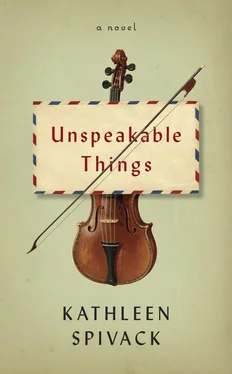“My dear little Anna,” said Herbert, finally finding his voice.
“It does not matter,” the Rat replied, smiling through tears and patting his arm.
“And your hair?” Herbert marveled. “It has gone completely white.”
“Yes,” said Anna simply. “It turned white overnight. Suddenly. From shock.” She looked at Herbert sadly. “But we will not speak of that now,” she said. “Now we speak only of our happiness in being together, my dear friend.”
“Come, children,” Herbert said suddenly, commanding them. In one quick motion, he bent down and picked up the little Rat in his arms. She wrapped her ragged blanket around her shrunken body as Herbert swooped her up. How small she was. Her little body lay in his arms without weight. He felt the sharp curve of her spine, and gently, almost absently, he ran his fingers over it. His fingers remembered the shape of her body, and his own echoed with memories of desire.
“My dear Herbert, where are you taking me?” she asked. A cloud of dust motes rose around her clothes and hung in the air of the library, turning golden in the late-afternoon sun that slanted into the reading room.
“I am taking you back home with me,” replied Herbert firmly as he walked slowly, carrying the little Rat in his arms, toward the large entrance doors. “Come, children.” He did not turn around to see if they were following, for, as usual, he expected and usually got total obedience from them. Maria took Philip’s hand, and the two children, fascinated, followed Herbert and Anna toward the door. “David’s wife is a good woman,” Herbert said to Anna. “You will stay with us.”
“But, Herbert, are you sure?” Anna asked. Herbert didn’t answer; he was not sure of anything.
“How did you find me?” Herbert was asking the little Rat as he carried her, weightless, shrunk into a third of herself, in his arms through the streets. He bore her ceremonially, draped across his own body. The children followed, trying to catch the words of the older couple.
“It was not a problem, finally,” said Anna. “You have friends. Perhaps I have the same friends. It does not do to look too closely at such matters.”
Herbert nodded yes. He was becoming resigned to yet another burden.
“What matters is that they brought me to you.” Anna sighed, giving herself up to the luxury of being cradled, carried like a child, to some unknown destination. She closed her eyes and seemed to fall into a soft trance, assuaged at the end of a long journey.
“Sleep, sleep, my dear little Rat,” Herbert whispered. His heart swelled.
Maria caressed Philip’s hand. “My dear little brother,” she thought. She had rarely felt so tender toward him.
When they reached the apartment building, they walked past the inquisitive eyes of Shirley, the elevator operator, who closed the iron grating once they had entered. “Evening, Professor,” did not require an answer.
They walked into the little room on the top floor. Maria’s mother looked up as they entered the small room that was home. She straightened, wiping her hands on her apron. She had been peeling potatoes, and the brown rinds lay next to the glowing globes, white knobs of potato bones in the half-light. Herbert set Anna down; she tottered feebly, then straightened herself as best she could to her bent-shrimp position. The Rat looked upward, a tremulous, unsure half smile on her face. The children’s mother looked back intently. Then she extended her hands to the older woman, drew her close, and, putting her arms around her shoulders, led her to a chair.
“So it is decided, then?” asked Herbert, looking at his daughter-in-law.
“Yes, Papa. It is decided. It is fine.” Ilse looked into the face of the Rat.
“Good.” Herbert said. “Danke schön,” he added quietly, so that only the air around him heard.
“You will share the daughter’s bed,” said Ilse. Maria looked up sharply, her lips parted. But something in her mother’s eyes stopped her.
“Thank you,” whispered the Rat. She turned her head painfully, so her eyes met those of the girl. “Thank you, child.” So it was decided, and Maria stifled her hot protest.
Chapter 2 NEW YORK, NEW YORK
N ew York, New York. City of Dreams. New York, like a brace of trumpets, welcomed them. Received all of them, the immigrants. They poured into her huge maw just as the steam poured out of the smokestacks of the large ships that had brought them there. New York, City of Welcome. The trumpets screamed in unison, held to the large smiling mouths of sweating musicians. The sailors sweated in the engine rooms of the large ungainly steamships. New York, City of Refuge. New York, City of Hope. The strident avenues streaked across the city, silver: fiery arrows like long, bright sounds, almost too much for the ear to bear. And still the band played. Louder. More volume. New York, and the gleaming saxophones entered in chorus. New York. And now the trumpets rose to a wail, a cry of pain, and the saxophones sang of darker things. Sadness. Nostalgia. New York, City of Dreams Left Behind. New York.
The great ships drew into the harbor, parting a dark veil of raindrops to reveal Miss Liberty, a pigeon on her head. A strange language, sounding to the ears of the strangers like the guttural barking of dogs. Across the water, uptown and downtown, in the gleaming cathedral city, Manhattan, the jarring music lured. New York. Like a faraway walled city of many oblique castles. As in medieval times, there were the lords of the manor, whisked away silently in great soft cars. And there were the serfs, toiling in the streets, to be seen behind the quick, frightened, averted eyes, behind the racks of clothing wheeled through the open air, or, if lucky, behind the wheels of taxis, cunning, swift, opinionated, serfs nevertheless.
The winds swept, merciless, about this city. Like the knife-sharp notes of a clarinet, rising with authority above the insistent throbbing bass notes of everyday street life. The wind pierced the thin bodies of the immigrants. But here, unlike in their native Europe, the skies were blue and clear. The sun shone, jabbing at them through the cold. Snow fell on the city, and for a brief time the snow sparkled in clean light. The sky was blue as a cantata. There was some rain, of course, but never the low skies of Germany or Austria or Russia or Poland.
The immigrants sighed for the gray deceiving light of their native lands. They longed for the cloak of darkness. They had gotten into the habit of scheming. Underground life, in a certain way, suited them. They were not fit for such direct light. New York fixed its pitiless gaze on their struggles and laughed.
But they were to retain their habits of secrecy. Clutching their worn coats about them, those coats of what had once been “good tweed,” they huddled, heads averted, through the city’s arrowed streets, hiding their eyes from this cold, this wind, this all-seeing sky and sun. How could it be so cold and yet so blue? “Blue, blue, blue,” sang the black musicians up in Harlem. But blue was different there: a smoky, aching, shadow sort of blue.
Each week, the ships came into the harbor, disgorging the crippled remains of Europe, already charred, or at least forever marked. “Bring me your huddled masses,” Miss Liberty had cried. And so they came. But for many of them, it was too late. Too late to join the concert of trumpets, too late for joy. They feared these bright Americans, with their “Can do” and “Will do” and easy self-assurance and “How do you do” and their too-open gaze. They crept, half-broken, onto the terrain that was New York and wanted only to rest.
But New York moved quickly. How could one rest? And where? The immigrants shuffled along as best they could behind the city’s optimistic rhythms, searching the darkest corners, that stubborn, dear, familiar darkness, in which to hide.
Читать дальше












